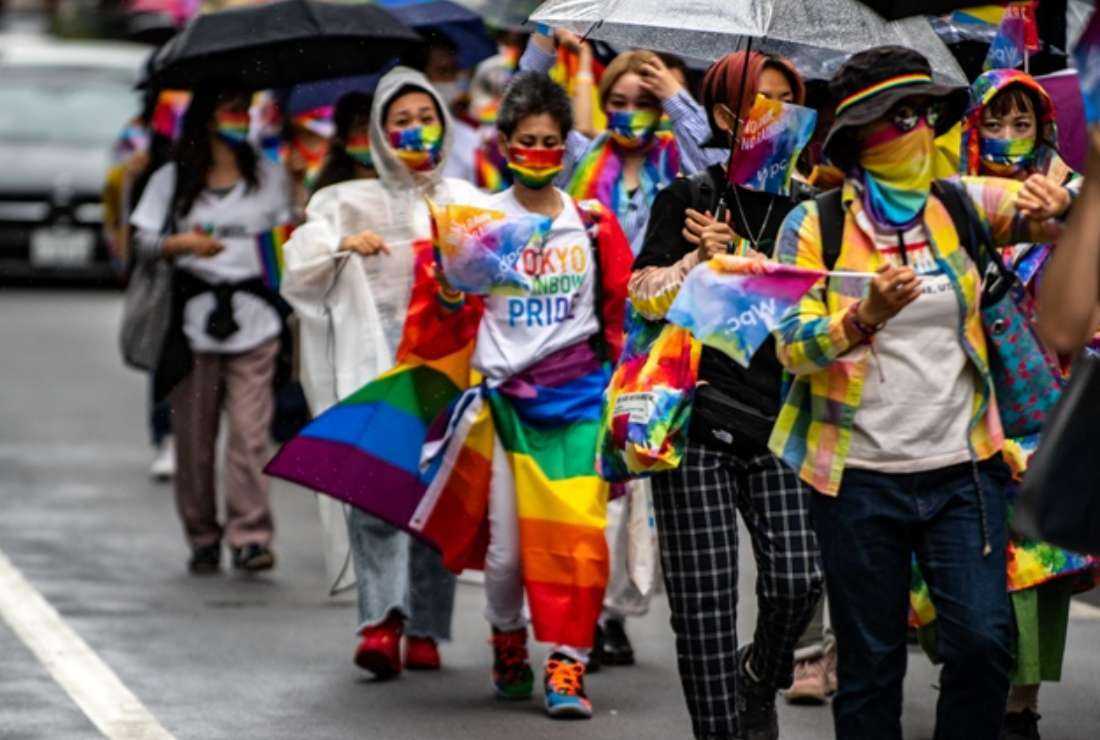
People attend the Tokyo Rainbow Pride 2022 Parade in Tokyo on April 24, 2022, to show support for members of the LGBT community. (Photo: AFP)
US Ambassador to Japan Rahm Emanuel said recently in Tokyo that he has "full confidence" that the Japanese government will take necessary steps to ban discrimination against LGBTQ (lesbian, gay, bisexual, transgender, and queer ) people, leaving Japanese people wondering what he was referring to.
Apart from a few silly remarks made by old-guard politicians from the ruling party who were swiftly reprimanded by the prime minister himself, there has never been any widespread discrimination against gay people in Japan. This has to be stated clearly.
On the contrary, there is a lot of open tolerance in Japan for LGBTQ people. As of now, 34 local governments, including in Shibuya, Setagaya, and Edogawa wards, are open to same-sex relationships, even marriage, although it may still not be legally binding.
About 68 percent of the Japanese public, especially the younger generation, accept homosexuality, according to the 2019 Global Attitudes Survey.
I bet anyone reading mainstream media headlines these days calling an end to “gay discrimination in Japan” would be shocked to know that the first pride parade in the archipelago was held in August 1944. It was organized by Minami Teishiro, a well-known activist and the creator of the gay journal, Adon, who also founded the ILGA (International Lesbian and Gay Association). It marked the launch of a yearly series of pride activities that attract thousands of people to this day.
As a matter of fact, there is already preparation for this year’s Tokyo Rainbow Pride, and here is how the event is described by the community itself:
“Anyone can enjoy the three days of parades and events, regardless of gender or sexual orientation. These include the yearly parade as well as exhibits and performances for LGBT-friendly companies in Yoyogi Park. The path of the procession circles the Harajuku/Shibuya area for around 3 kilometers. Like any good Pride parade, the attendees march and ride on floats while sporting attire that reflects the diversity of the community. Here's your chance to experience Pride in Japan if you've never done so.”
Did we read any warnings against potential threats and discrimination? Of course not.
Japan is a country with a vast majority of citizens still unable to comprehend why there should be more than two sexes, but has gone ahead and adopted gender-neutral toilets and the option of not revealing one’s gender on a job application.
This last one is much harder to understand for the rational mind of a Japanese person. Because isn’t it the women who get pregnant and men don’t? Also, women on average work less as higher testosterone cause men to be more ambitious and competitive while women, when pregnant, tend to leave their job with some never to return.
Therefore, such information on a job application isn’t about discrimination per se, but simply a fact that an employer may use as per discretion to choose the best candidate possible for the job. By that same parameter, we may consider as discriminatory the practice of drafting someone into a basketball team on the basis of height.
Having lived here almost 10 years now, I have never heard a Japanese person spew offense at a homosexual like in some southern European countries.
So are we referring to gay couples being granted the same financial and medical visitation privileges as ordinary married couples? Or the lack of freedom for a trans man to enter a women's restroom or hot spring while a group of middle school girls is changing? The latter incident did occur and the person posing as a woman was immediately apprehended.
And last but not least. What right does the US ambassador have to interfere with another country’s internal affairs and legislation? He comes from a country that exported its Puritan traditions to Japan — before the arrival of Americans, the Japanese would enjoy mixed hot springs with both sexes peacefully and comfortably naked.
How arrogant of the Americans to point out that the Japanese are the ones who are being the bigots. Let’s not forget this preaching comes from a country where identity politics has wreaked havoc with the social fabric of the nation.
That is why for the average Japanese person, each call for “support of sexual diversity” looks suspicious if not outright menacing as they watch the so-called social progress unfolding on the other side of the ocean.
*The views expressed in this article are those of the author and do not necessarily reflect the official editorial position of UCA News.


